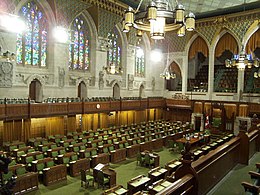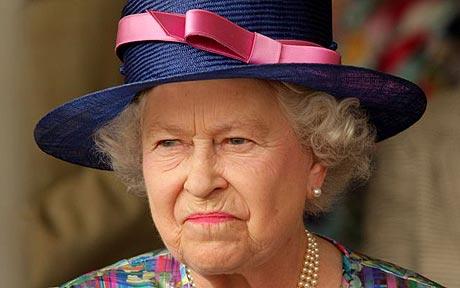When are Federal Elections held? There are 3 possible situations where an election can be called:
1) 5 years since the last election.
2) If the government (governing party) decides they want one.
3) If the government is defeated on a confidence vote (must-pass bill), such as the current situation with the budget. This isn't ever an actual disagreement with the bill, it's just when the opposition thinks they are ready for an election.
Majority vs Minority Governments:
If a party wins 50%+1 seats they have a majority government. It is then their sole discretion as to when the next election is (option 1 or 2) since everyone in the party always supports the motions of confidence put in front of them because they're obviously not going to do anything that could cost them their job. If a party wins less than 50% but garners the most seats (possible in a 3+ party system) they are traditionally given a minority government where all options are possible. A third type of government is theoretically possible in a coalition which would combine their seats to create a majority. This would cause a lot of unprecedented drama (understatement).
Pros and Cons: I'll preface this with the fact that Canadians hate elections. We hate elections in winter when we have to trudge through a blizzard. We hate elections in spring when we're dealing with flooding. We hate elections in summer when we want to turn off the TV and go on vacation. We don't quite hate elections as much in fall as the kids are back to school and we're looking for some entertainment, but most would still rather watch a few episodes of the new soon to be cancelled sitcoms. Majority governments sit back and enjoy the status quo getting absolutely nothing done - don't rock the boat - but we don't have the overwhelming dread of elections around the corner. Minority governments get a lot done because the opposition is just chomping at the bit to bring them down so they have to keep up with doing what we want them to so they don't at any point look bad if at all possible.
Political Structure - From the ground up:
The way the power structure actually works in Canada is precisely opposite of the way it is laid out in terms of authority. Messed up, I know. But the thought of having it set up the 'right' way is horrifying.
Bureaucrats: In Canada bureaucrats are typically known for being huge policy wonks and are able to hold rather long term positions because of their willingness to use any playbook put in front of them. A fairly stark contrast to the rabidly partisan counterparts who get swapped out fairly quickly en masse when power changes hands in the US. I had a political science professor who always said if you want real power in Canada, don't be a politician. Be a bureaucrat. They decide how, where and when policies are implemented and enforced.
House of Commons: We elect Members of Parliament to represent us nationally in the House of Commons in Ottawa. This is considered to be the lower house, similar to the House of Representatives in the US. Everyone votes only for their local rep who is part of a national party. The party that wins the most seats becomes the government. The leader of that party becomes the Prime Minister and head of the country, kind of like if the House majority leader would become president. Geographic distribution of the 308 seats is determined by population, roughly trying to encompass 100k people per seat with one caveat. During the 1980s Quebec thought they were so special that to protect their specialness, they needed to be more special than the rest of us and held the country hostage trying to hammer out a new constitution demanding minimum 25% of all seats regardless of their relative population. This is apparently not enough, see below.
Senate: This is the upper house, meant to be a "sober second opinion" free of the ramifications of being unpopular because they are unelected but rather appointed by the Prime Minister (GG, see below). Essentially what this boils down to is a bunch of politically rewarded old guys rubber stamping every bill that comes up because they've got better things to do in their retirement. Everyone is pretty much in agreement that this needs to be abolished or turned into a regionally based elected house. That is, except for the old guys raking in a nice paycheck for nothing and the politicians losing the utility of an effective loyalty gimmick.
Governor General: The representative of the 'official' head of state, the queen. We're still part of the British Commonwealth (royal family and all that jazz) even though they couldn't be bothered with us. The feeling is mutual. What this means is that any time the Prime Minister makes some sort of traditional or formal declaration, decision or appointment, he sends it off to the GG as a 'recommendation' and she/he reads it to make it official. Imagine Barack Obama having to be a ventriloquist and whip out the Mini-Me version of the queen every time he says something formal. However the potential for the previously reffered to coalition may actually give the GG the first real, meaningful choice they've had to make in the past century as they are officially responsible for handing over governing power.
The Parties:
This is essentially a perpetual dual between the Liberals and Conservatives with a few odd people wanting to jump into the middle of the action but haven't heard that you shouldn't bring a knife to a gun fight. I'll rate these on a left to right 0-10 scale using the US Democrat and Republican parties as the 0 and 10 standards.
Conservatives (5):
Led by current Prime Minister Stephen Harper. General all around control freak appearing rather cold and calculating most of the time who is fairly effective at getting his message across and getting things done the way he wants. You know it's almost election time when the snapshots of sweater-wearing, piano-playing-and-serenading Steve at the Conservative Christmas party start showing up to lighten his image. Steve and the Conservatives are as far right wing as this social program loving country allows, kind of like George W. Light. This party is the phoenix of the Progressive Conservative ashes Brian Mulroney left behind combined with the ultra-right wing now defunct Refoooooorm and Alliance parties of Preston Manning who Don Ferguson does an amazingly good imitation of. Originally combined to avoid the right wing vote splitting keeping the Liberals in power, they were to be called the Canadian Conservative Reform Alliance Party (CCRAP). Also known as the Tories.
Liberals (0):
Pretty much the definition of a US Democrat, considered slightly left of centre here (fun fact: English Canadians use the French spelling of center). Led by Michael Ignatieff, Cambridge / Oxford / Harvard professor known for thinking rather highly of his intellectual self. This is the party of more well known Prime Ministers such as Jean "a proof is a proof" Chretien and Pierre "just watch me" Trudeau. Also known as the Grits.
New Democratic Party (- 4):
These are your run of the mill union heroes. Current leader is Jack Layton. The very existence of this party is what prevented the Liberals from grasping a permanent majority government by splitting the left wing vote and allowing the new Conservatives to get a foothold. Kind of ironic that they're the ones giving the right wing party they ideologically despise the opportunity to form government. For that, they are eternally doomed to shout from the far side of the House and current forecasts state they don't have any reasonable chance at actually becoming the government in the next 100 years. The Bloc has more seats and a better chance at 0%. Exercises in futility repeated election after election. Insanity.
Bloc Quebecois (?):
Somewhat of a ragtag group led by Gilles Duceppe. This party only runs in Quebec. I admittedly don't know a lot about this party because of that. It's tough to say exactly what kind of ideology they represent as they tend to be supported by rural conservatives and urban unions. I do however find it odd that not only is a political group who's stated goal is the destruction of the country not charged with treason, it is welcomed with open arms into the House. Democracy at it's finest.
Current Seats
Conservative
Liberal
Bloc
NDP
There's a few other odd parties, notably the Green party who runs across the board and are obviously left wing environmental types yet to be elected to a seat, but these are the important players.
The interesting situation here is that we've been in this stalemate where we have election after election after short stints of minority government for the greater part of the last decade and everyone's getting sick of it. My suspicion is that if we get the same result again, the 3 opposition parties will be trying to catch a good public vibe on proposing a coalition majority government of Liberals, NDP and the Bloc for stability's sake as opposed to the instability of another minority Conservative government -- at least that's what they'll say to the GG. This could also easily backfire if the vibe comes down as a government no one voted for takes over by ironically installing the Separatist Bloc as the ones propping the whole thing up. We'll have to see what the 3 Stooges have in mind.














No comments:
Post a Comment